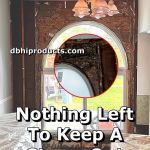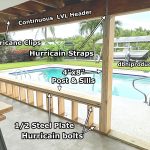Termite Problems? Living With, Buying Or Selling A Home. What You Need To Know
At db Home Improvements, we specialize in termite damage repair. Once your termites are treated, the evidence they were ever in your home is long cleaned up it appears your home is in good health.
Unfortunately, there is always damage done by the time termite evidence is noticed. Most of the time, the damage is in the building envelope (outside walls and trusses). Your building envelope is what keeps hurricanes out of your Florida home. We have repaired homes from minor damage to complete walls, and trusses. We remodel all the termite damage, to move in ready.
Buying A Home
All too often, termite damage for the homeowner starts with the same story. I just purchased my house. The previous owner disclosed on the seller’s disclosure sheet that termites had been treated. The sellers also replaced baseboard, repaired siding and sheetrock, so the home inspector could not “visibly see” termite damage. (This could lead to compensation for the new buyer. Consult a Real Estate lawyer, we are not).
So be careful when buying a home. Home inspectors look for evidence like dust, wings and droppings that accumulate at the bottom of walls and window sills. They also may bang baseboards to see if there are any termite tunnels or compromised wood. There is no way to look through a wall and find damage unless there are bugs present. Heat detectors can find active bugs in the walls. Real estate home inspectors do not have the expensive equipment to inspect with heat for active termite colonies.
Termite treatment companies look a lot harder for termites because they are paid when they find them. It is worth paying a treatment company to inspect the house because if the seller did not know they were in the house there is no recourse for the buyer, and the buyer will foot the bill for treatment and damage repair. If you do find active termites in the seller’s house, the seller will have to disclose the termites because it is known. This may be a good negotiation point for you. We will build you a clean, wind-code bill of health for your new home.
Selling A Home
If you are selling your house with termites, don’t be this guy we see so often. Replaced baseboard, repaired siding and sheetrock, so the home inspector can not “visibly see” termite damage and sell your problem. Your mother didn’t raise you like that. If she did, it would be a good time to change. Disclose the treatment and the damaged areas the exterminator found so we can have a report as to where the repairable damage is.
To ensure that your transaction goes smoothly, be forthcoming. Use licensed contractors and a certified termite inspector or exterminator for all inspections and repair work. This way, you will be legally protected if anything was not done in accordance with laws or building codes with the documents the pros provide.
The bottom line is that, if you can produce documentation detailing how you have dealt with any termites and resulting damage, more buyers will have fewer objections. If you can prove also that you have kept up with ongoing treatment to make sure the problem doesn’t resurface, then you should have no problem selling your home.
If, however, you have not repaired damage done by termites or controlled the infestation, these facts can have a significant impact on your ability to sell your home once they are found out.
After Treatment
The next step is to get a licensed contractor to inspect and evaluate your exterminators’ report for existing termite damage. If the inspection turns up any problems, have them fixed. This could be a simple fix or a major repair, but either way, having the work done before listing the house will remove most of the objections that potential buyers may pose.
If you choose not to fix the issues prior to listing your house, you may have a longer time to get a buyer. Closing can be delayed. Surprises often cause a buyer to walk out on the deal or negotiate the selling price. Both scenarios lead to delayed closings. When active termites are on the seller’s disclosure sheet, potential buyers will likely submit offers much lower than the listing price if the house has untreated termite problems or existing damage.
Call us @ 772-353-0140 for all of your structural repair needs. We are here to help. No matter if you have one damaged joist in an accessible crawl space or termites get into your walls, trusses, then eat your kitchen and bathroom, our structural and design and craftsmen team can put it all back for you. One call gets you finished results.
Dry wood termites swarm like ants when they are ready to divide the nest into smaller locations. The other major indicator that you’ve got a termite problem is mud tubes. These are small protective tubes made of soil and wood, which are most commonly used by subterranean termites to avoid lizards eating them while shielding themselves from dry environments and the sun.
Subterranean termites use mud tubes to travel back and forth between their food source, your home, and their nest in the ground. If you find a mud tube around your home, it may or may not be active, but it also basically means you have or had a termite infestation at some point, if not an active one right now. If you think you may have termites, call a pest control expert ASAP, and then call us to make the necessary repairs to your home.
Basic termite symptoms: Termite damage evidence is seen in hollowed or damaged wood that can start as needle-size holes appearing in the wood or through paint. You may also notice discarded insect wings near windows, doors, or other access points for termites, as well as droppings that resemble coffee ground or sawdust, because of termite infestation
Structural engineering, architects. design and carpentry services
Serving: Martin County, Indian River County, Saint Lucie County
db Home Improvements since 2006, A+ BBB rateing and no complaints, check our 5 star reviews.








